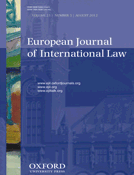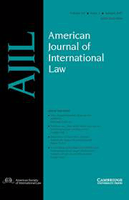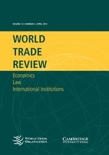
Northwestern Journal of International Law & Business
Scope & Guideline
Exploring Global Perspectives in Law and International Commerce
Introduction
Aims and Scopes
- International Trade and Economic Law:
The journal extensively covers issues related to international trade agreements, economic policies, and their legal implications. This includes analyses of trade relations between nations, dispute resolution mechanisms, and the impact of international regulations on domestic economies. - Corporate Governance and Accountability:
A significant focus is placed on the governance structures of multinational corporations, particularly concerning their responsibilities in international contexts. This includes discussions on corporate ethics, transparency, and the legal frameworks governing corporate behavior in different jurisdictions. - Emerging Technologies and Regulation:
The journal explores the legal challenges posed by advancements in technology, such as data privacy, cybersecurity, and the regulation of digital markets. This reflects the growing importance of technology in international business practices. - Human Rights and International Law:
There is a consistent emphasis on the intersection of human rights and international law, particularly in investment contexts. The journal examines how international investment treaties and corporate actions impact human rights globally. - Comparative Legal Analysis:
The journal often employs comparative methodologies to analyze legal frameworks across different countries, providing insights into how various legal systems address similar issues in international business and trade.
Trending and Emerging
- Non-State Actors and Corporate Responsibility:
There is a growing emphasis on the role of non-state actors, particularly transnational corporations, in international law. Discussions focus on corporate accountability, personhood, and responsibilities towards human rights and social justice. - Influencer Marketing and Digital Economy Regulations:
The journal has begun to explore the legal implications of influencer marketing and the digital economy, reflecting the rise of social media and its impact on business practices and consumer protection. - Health Policy and International Trade:
Recent publications indicate an increasing focus on the relationship between health policy and international trade, particularly in the context of drug availability and healthcare costs. This theme highlights the intersection of legal, economic, and social issues in global health. - Geopolitical Implications of Technology:
The implications of technology, particularly in relation to data flows and big tech regulations, are emerging as critical themes. This reflects the importance of understanding how technology shapes international relations and business operations. - ESG (Environmental, Social, Governance) Considerations:
There is a rising trend towards integrating ESG factors into discussions on international business law, particularly in the context of investment strategies and corporate governance. This reflects a broader societal shift towards sustainability and ethical business practices.
Declining or Waning
- Traditional Investment Treaties:
There has been a noticeable decrease in discussions surrounding traditional bilateral investment treaties (BITs). As global investment dynamics evolve and new frameworks emerge, the relevance of BITs appears to be diminishing. - Antitrust Issues in Established Markets:
Antitrust discussions, particularly in well-established markets, have seen a decline. This could suggest that the journal is shifting focus toward more innovative regulatory challenges posed by new business models and technologies. - Environmental Regulation in International Trade:
While still relevant, the frequency of papers specifically focusing on environmental regulations in the context of international trade has decreased. This may indicate a shift towards broader discussions that incorporate environmental considerations within other frameworks. - Historical Legal Analyses:
There seems to be a waning interest in historical legal analyses related to international law and business. The journal appears to be favoring contemporary issues and forward-looking discussions over historical perspectives.
Similar Journals

JOURNAL OF WORLD TRADE
Exploring the Dynamics of Global Trade LawJOURNAL OF WORLD TRADE, published by Kluwer Law International, is a premier academic journal dedicated to the in-depth exploration of international trade, law, and economics. With an ISSN of 1011-6702 and an E-ISSN of 2210-2795, this journal has become a significant resource for researchers, professionals, and students alike since its inception in 1996, offering valuable insights into the complexities of global trade relations and international legal frameworks. The journal is recognized for its robust academic contributions, holding a Q3 classification in both Economics and Econometrics and Political Science and International Relations for 2023, with an impressive Q2 ranking in Law. The Scopus rankings further highlight its influence within the academic community, particularly in the fields of law and political science. Although it is not an open-access journal, it remains an essential reference for those engaged in scholarly discussion and practical applications of international trade laws. The JOURNAL OF WORLD TRADE is essential for anyone interested in advancing their understanding of the challenges and evolutions within the complex landscape of global trade.

COLUMBIA JOURNAL OF TRANSNATIONAL LAW
Exploring the Intersection of Law and Global Affairs.The COLUMBIA JOURNAL OF TRANSNATIONAL LAW, published by the COLUMBIA JOURNAL TRANSNATIONAL LAW ASSOCIATION, stands as a premier academic platform in the fields of Law, Political Science, and International Relations. Having maintained a commendable Q2 ranking in both law and political science categories for 2023, it represents a vital resource for scholars and practitioners alike in navigating the complexities of transnational legal issues from 1996 to 2024. Situated in the U.S. at the esteemed Columbia University School of Law, the journal not only meets the rigorous academic standards but also addresses pressing global challenges through interdisciplinary research. Although it does not currently offer open access options, its commitment to providing insightful analyses and fostering robust scholarly dialogue in a rapidly changing world remains paramount. With its inclusion in reputable databases like Scopus, the journal is poised to impact the academic landscape significantly, catering to both emerging and established voices in transnational law.

European Journal of International Law
Connecting scholars to pressing international legal issues.The European Journal of International Law (EJIL), published by Oxford University Press, stands as a leading platform for the dissemination of innovative research in the realms of International Law and Political Science. With an impressive ISSN of 0938-5428 and E-ISSN of 1464-3596, this prestigious journal has achieved Q1 rankings in both Law and Political Science and International Relations categories as of 2023, emphasizing its significance among contemporary scholarly publications. Spanning contributions from a diverse range of disciplines, the EJIL serves as an essential resource for researchers, professionals, and students alike, promoting critical dialogue on pressing international legal issues. Although currently not offered as an open-access journal, it continues to retain a high impact factor, as evidenced by its substantial Scopus rankings, placing it within the top percentiles in multiple categories. Its commitment to scholarly excellence is reflected in a convergence of research trends from 2005 to 2024, and it remains dedicated to fostering informed discourse on global legal frameworks and their implications.

International Environmental Agreements-Politics Law and Economics
Bridging disciplines to foster effective environmental policy.International Environmental Agreements-Politics Law and Economics, published by SPRINGER, is a leading journal dedicated to exploring the intersection of economics, law, and political science as they relate to international environmental agreements. With impressively high rankings in its respective categories—Q1 in Economics and Econometrics, Law, and Political Science and International Relations—this journal serves as a critical platform for rigorous scholarly discourse, addressing pressing global challenges and fostering understanding among policymakers and academics alike. The journal is indexed with an E-ISSN of 1573-1553 and maintains a strong presence in Scopus, excelling in multiple disciplines (ranked #40 in Law, #39 in Political Science, and #128 in Economics). Despite being a subscription-based journal, its comprehensive analyses and innovative perspectives make it an invaluable resource for researchers, professionals, and students committed to advancing sustainable environmental governance. Established in 2003, the journal continues to contribute to the field with engaging content that encourages interdisciplinary collaboration and furthers the study of international environmental treaties.

CORNELL INTERNATIONAL LAW JOURNAL
Empowering practitioners with essential insights in international law.CORNELL INTERNATIONAL LAW JOURNAL, published by CORNELL LAW SCHOOL, is a premier academic journal dedicated to advancing scholarship in the fields of law, political science, and international relations. Established with a commitment to fostering critical dialogue, this journal provides a platform for innovative research and legal analysis on pressing global issues. With an ISSN of 0010-8812 and an E-ISSN of 1930-7977, CORNELL INTERNATIONAL LAW JOURNAL holds a respectable Q3 ranking in the 2023 categories of Law, and Political Science and International Relations, underscoring its relevance within the academic community. The journal is indexed in Scopus, achieving a rank of #416 in Law and #345 in Political Science, illustrating its significant impact and accessibility. By providing essential insights, this journal aims to serve not only academics but also practitioners and policymakers interested in the evolving landscape of international law and governance.

AMERICAN JOURNAL OF INTERNATIONAL LAW
Fostering Scholarly Dialogue in Law and PoliticsThe American Journal of International Law, published by Cambridge University Press, stands as a crucial platform for scholarly discourse in the fields of law, political science, and international relations. With a longstanding tradition since its inception in 1937, this prestigious journal has maintained a remarkable reputation, reflected in its Q1 ranking in both Law and Political Science and International Relations as of 2023. It is recognized for its rigorous peer-review process and impactful contributions to the understanding of legal frameworks and international governance. Researchers and practitioners alike will find the journal invaluable, not only for its comprehensive analyses and original research articles but also for its commitment to advancing the field. Although it does not offer open access, its accessibility through academic institutions ensures that a broad audience can engage with its content, making it essential reading for those involved in international legal scholarship.

Journal of International Dispute Settlement
Bridging Disciplines for Effective Dispute SettlementThe Journal of International Dispute Settlement, published by Oxford University Press, serves as a pivotal platform for scholarly discourse in the realms of Law, Political Science, and International Relations. Since its inception in 2010, this esteemed journal has contributed significantly to the understanding and resolution of cross-border disputes, attracting a distinguished readership comprising researchers, practitioners, and students alike. With an impressive Q1 ranking in Law and a Q2 ranking in Political Science and International Relations as of 2023, it stands out as a respected source of high-impact research that explores both theoretical frameworks and practical implications of international dispute mechanisms. The journal is housed in the United Kingdom and is committed to fostering open dialogues on contemporary challenges in international law, thereby enhancing the knowledge base and informing policy-making. Look forward to innovative articles and critical analyses that push the boundaries of current research and pave the way for future advancements in the field.

World Trade Review
Exploring the Frontiers of Global Trade DynamicsWorld Trade Review is a prestigious academic journal published by Cambridge University Press, focusing on the intricate dynamics of international trade, economics, law, and political science. With its ISSN 1474-7456 and E-ISSN 1475-3138, this journal has been a cornerstone of scholarly communication since its inception in 2002 and is poised to continue contributing to its field until 2024. Notably, it holds a Q3 ranking in Economics and Econometrics, and Q2 in both Law and Political Science and International Relations, emphasizing its critical role in advancing knowledge across these disciplines. Additionally, the journal enjoys commendable Scopus rankings, with a 79th percentile in Law and a 71st percentile in Political Science, affirming its relevance and impact in academic research. Although not currently an open-access publication, it remains a vital resource for researchers, professionals, and students eager to explore and contribute to the evolving landscape of global trade and its multifaceted implications.

University of Pennsylvania Journal of International Law
Empowering Legal Minds for a Global FutureThe University of Pennsylvania Journal of International Law is a pivotal academic publication that serves as a forum for groundbreaking legal scholarship, particularly in the complex and dynamic field of international law. Published by the University of Pennsylvania Law School, this journal supports a diverse array of interdisciplinary research and discourse, capturing insights that bridge legal, economic, and political landscapes. As of 2023, it is positioned in Quartile 3 in Law and Quartile 4 in Economics according to Scopus rankings, underscoring its relevance and contributions to legal academia. The journal is accessible through conventional methods, with its physical presence anchored in Philadelphia, Pennsylvania. With a commitment to fostering dialogue on both emerging and traditional legal issues, the journal aims to engage scholars, practitioners, and students alike, encouraging contributions that enrich understanding and drive progressive legal thought. This commitment to academic excellence ensures that the University of Pennsylvania Journal of International Law remains a vital resource for those seeking to navigate the challenges of international legal frameworks.

Journal of East Asia and International Law
Advancing Legal Scholarship in the Heart of East AsiaThe Journal of East Asia and International Law, published by the YIJUN Institute of International Law, serves as a vital platform for scholarly discourse in the field of law, with a particular focus on the complexities of East Asian legal systems and their interactions within the global context. Established in 2011 and based in Seoul, South Korea, this journal has been pivotal in fostering research that examines legal issues impacting East Asia, making significant contributions to the understanding of international law in this dynamic region. With its ISSN 1976-9229, the journal provides a valuable resource for researchers, professionals, and students interested in the evolving legal landscapes of East Asia. Though currently categorized in the Q4 quartile for law in the Scopus rankings, its dedication to enhancing legal scholarship positions it as a relevant player among emerging international law journals, encouraging submissions that explore innovative legal approaches and analyses. As ongoing interdisciplinary discussions deepen, the Journal of East Asia and International Law aims to enrich the academic community's understanding of international legal frameworks within East Asian contexts.